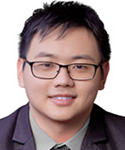
Dr. Xiang Lin
School of Chinese Medicine, Li Ka Shing Faculty of Medicine, The University of Hong Kong, China
Title: Targeting regulatory B cells in autoimmune diseases
Abstract:
Immune
dysregulation in systemic autoimmune diseases, such as Sjögren’s syndrome (SS),
rheumatoid arthritis and systemic lupus erythematosus has been recognized as the
imbalance of regulatory to effector cell subsets. Taking SS as example, our
studies have first revealed the defective IL-10-producing capacity in
regulatory B (Breg) cells in both humans and murine model, which was critically
involved in T cell homeostasis. However, seldom therapeutic agents targeting
Breg cells are available to treat those autoimmune diseases. Previous studies
have shown therapeutic effects of ethnic medicine on patients with SS. We have
identified that acteoside (AC), a caffeoyl phenylethanoid glycoside from a
medicinal herb Radix Rehmanniae, could promote IL-10 production from
both human and murine B cells via critically
regulating the TLR4/PI3K axis. Moreover, TLR4 was found increased in Breg cells
from mice with experimental SS (ESS), a mouse model that recapitulates human
SS. Thus, B cells from the ESS mice were susceptible to AC treatment, showing
higher IL-10-producing capacity than those from naive controls. Notably, we
found that AC was able to enter lymphoid organs upon oral administration. AC
treatment effectively increased IL-10+ B cells in ESS mice and ameliorated
disease pathology accompanied by reduced T effector cells, including Th17 and T
follicular helper cells in the ESS mice. In conclusion, AC could promote Breg
cell function and attenuate ESS pathology in vivo, which may be a promising drug candidate for
treating SS and other autoimmune diseases.
Biography:
Dr. Xiang LIN has completed his PhD degree at the School of Chinese Medicine, the University of Hong Kong. He did his postdoctoral trainings at the Department of Pathology and focused on autoimmune disease. Currently, he is an Assistant Professor with research interests of dissecting autoimmune pathogenesis and exploring the therapeutic strategies of Sjogren’s syndrome. He has published more than 25 papers in reputed journals and served as editorial board members of Frontiers of Immunology and Journal of Leukocyte Biology.